 Petzlover
Petzlover Cao de Castro Laboreiro is originated from Portugal but Spanish Mastiff is originated from Spain. Cao de Castro Laboreiro may grow 28 cm / 11 inches shorter than Spanish Mastiff. Cao de Castro Laboreiro may weigh 30 kg / 66 pounds lesser than Spanish Mastiff. Both Cao de Castro Laboreiro and Spanish Mastiff has same life span. Both Cao de Castro Laboreiro and Spanish Mastiff has same litter size. Both Cao de Castro Laboreiro and Spanish Mastiff requires Low Maintenance.
Cao de Castro Laboreiro is originated from Portugal but Spanish Mastiff is originated from Spain. Cao de Castro Laboreiro may grow 28 cm / 11 inches shorter than Spanish Mastiff. Cao de Castro Laboreiro may weigh 30 kg / 66 pounds lesser than Spanish Mastiff. Both Cao de Castro Laboreiro and Spanish Mastiff has same life span. Both Cao de Castro Laboreiro and Spanish Mastiff has same litter size. Both Cao de Castro Laboreiro and Spanish Mastiff requires Low Maintenance.
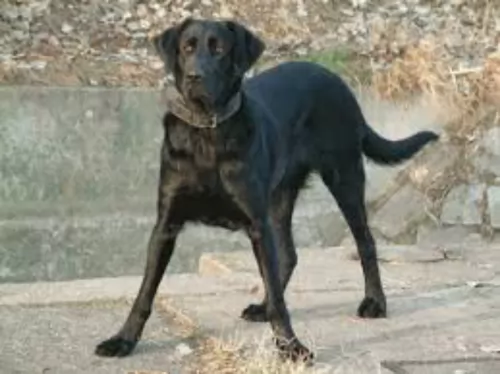 Cão de Castro Laboreiro originates from Portugal. Also known as the Portuguese Cattle Dog he was used long ago to guard livestock. Today, the modern Cao de Castro Laboreiro is descended from the molosser type dog.
Cão de Castro Laboreiro originates from Portugal. Also known as the Portuguese Cattle Dog he was used long ago to guard livestock. Today, the modern Cao de Castro Laboreiro is descended from the molosser type dog.
There are hints to the dog's origins from the 19th century, but changes in agricultural methods meant a disappearance of the dog as a livestock protector. Today the dog is mostly kept as a pet and was first seen at a dog show in 1914.
The Cão de Castro Laboreiro is recognized by the Fédération Cynologique Internationale as well as being recognized by the United Kennel Club in the United States.It is a rare dog and not many exist today but in Portugal, the USA and United Kingdom you will find a few breeders.
 The Spanish Mastiff is a giant breed that comes from Spain. He has always been a guardian dog.
The Spanish Mastiff is a giant breed that comes from Spain. He has always been a guardian dog.
He is an ancient dog breed, in fact dating back to medieval times. He has always been a guardian of livestock, protecting them from attacks from wolves and other predators.
The first breed standard of this pure breed dog was made by the FCI in 1946. A breeding program was also formed for this dog In 1981.
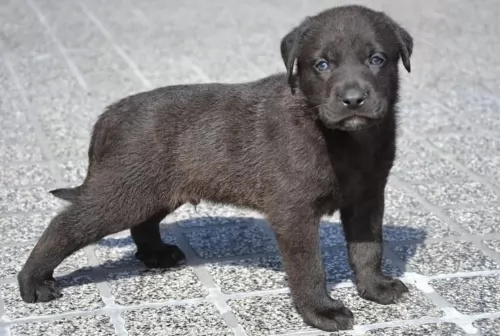 The Cão de Castro Laboreiro is a large dog, with height being in the region of 55 to 60cm and weight being in the region of 45 - 70kg. People describe the dog as wolf-like with a coat that is fairly short, thick and course. The coat is brindle with a base color of shades of grey, chestnut and black.
The Cão de Castro Laboreiro is a large dog, with height being in the region of 55 to 60cm and weight being in the region of 45 - 70kg. People describe the dog as wolf-like with a coat that is fairly short, thick and course. The coat is brindle with a base color of shades of grey, chestnut and black.
This large mastiff-type dog always has a black nose, his tail is long and carried high, but never curling over the back. He has a broad head and is much like the Labrador in looks, being free of wrinkles on the face.The ears of the Cao de Castro Laboreiro are medium-in-size and floppy while the eyes are dark brown.
The Cao de Castro Laboreiro makes an excellent pet as he forms strong bonds with his human family. He is territorial and makes an exceptional guard dog. He doesn’t particularly like strangers and is aloof around them.
This is an intelligent dog breed, he is strong-willed and stubborn, but when he is around the children in the family he is gentle and loving. When he has been trained and socialized, which is always highly recommended with every dog, he gets along with other pets in the home too.
 The Spanish Mastiff weighs between 52 and 100kg and the dog’s height is between 72 and 88cm. He has a thick, heavy coat with rustic colors of fawn, black, grey, reddish and yellow as well as brindle.
The Spanish Mastiff weighs between 52 and 100kg and the dog’s height is between 72 and 88cm. He has a thick, heavy coat with rustic colors of fawn, black, grey, reddish and yellow as well as brindle.
He is powerful and muscular with a huge head. The ears are medium length and floppy and the tail is long. If you were looking for a puppy, the American Kennel Club is the only site which has 100% puppies from AKC-Registered litters.
Large, kind, gentle and intelligent, the Spanish Mastiff is well balanced. When you see him you won’t find a dog that is light on his feet and who jumps around excitedly. He is a dignified, intelligent dog, quiet and calm.
Even though he is so calm, it is still a good idea to have him trained and socialized as his very size could be a problem. When you tell him to lie down, you want him to listen to you. This big, gentle giant is devoted to his human family ad takes the role of guardian and protector seriously.
He isn’t suited to life in the city but is better suited to a large property, also because he has a loud bark.
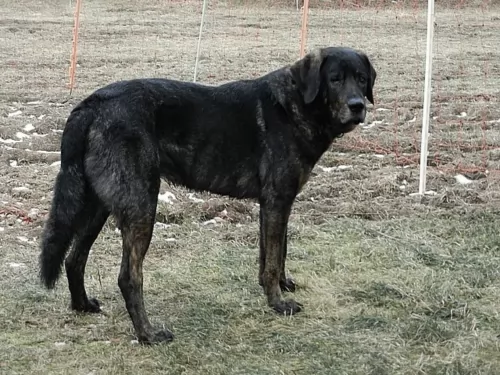 Environment and upbringing have plenty to do with how a dog turns out. People who just buy a dog for guardian purposes and nothing else can’t expect companionship in return.
Environment and upbringing have plenty to do with how a dog turns out. People who just buy a dog for guardian purposes and nothing else can’t expect companionship in return.
The Cão de Castro Laboreiro has always been a fearless guardian of livestock with his strong protective characteristics. He is intelligent and recognizes that a child in the family needs his protection.
This is a large dog who is strong, brave and intelligent but with his human family he is gentle, loving and loyal. Nonetheless he still requires a firm owner, and if you’re fair and firm with him you get the best with him. With this dog you can form a close friendship and bond.
 Kind, gentle, quietly confident and intelligent are just some of the wonderful characteristics of the Spanish Mastiff.
Kind, gentle, quietly confident and intelligent are just some of the wonderful characteristics of the Spanish Mastiff.
You can add loyalty and devotion to these characteristics too and the fact that he wants to protect you.
Your gentle giant is guaranteed to make you the most wonderful companion and he deserves the very best treatment there is.
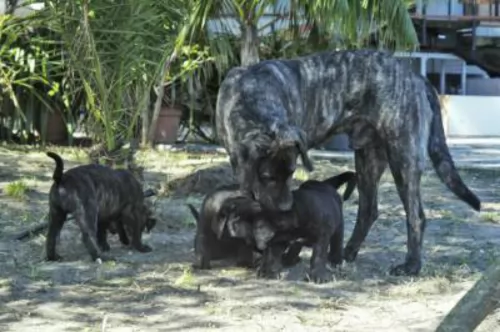 The Cão de Castro Laboreiro is generally a healthy breed, but even so, it is good to be aware of typical canine diseases that your pet may develop.
The Cão de Castro Laboreiro is generally a healthy breed, but even so, it is good to be aware of typical canine diseases that your pet may develop.
There are many eye problems that dogs have to contend with and if you see any kind of ulceration in your dogs eye, get veterinary advice.
A dog should always have access to a shady spot. Never ever leave your dog in a hot car. Heat builds up quickly and death can result soon as the body temperature rises.
Roundworm and tapeworm can infest dogs and you’ll need to speak to your vet about a worming program. Lice, mites and ticks are all parasites which attach themselves to the skin.
 It is good to be wise about some of the common dog problems there are that could plague your Spanish Mastiff. Vets are very familiar with these dog illnesses and they tailor their treatment to suit the needs of your dog.
It is good to be wise about some of the common dog problems there are that could plague your Spanish Mastiff. Vets are very familiar with these dog illnesses and they tailor their treatment to suit the needs of your dog.
Remember to get your pet vaccinated against the terrible diseases you get that can kill a dog – rabies, parvo and distemper.
People often think that obesity is something that isn’t dangerous, when in fact it is a serious disease that can cause joint problems, digestive disorders, heart disease, back pain and hip dysplasia.
Dogs rely on water just like what humans do to keep them healthy and functioning properly.
Water is critically important to every organ and also assists with digestion. Your dog is panting and urinating throughout the day and needs to replace the liquid he loses.
Dehydration in dogs results in loss of electrolytes, such as sodium, chloride, and potassium.This is bad as these minerals have important functions.
A dog that is dehydrated has loss of appetite, loss of skin elasticity, is lethargic, has sunken eyes, wants to vomit, has a dry nose and thick saliva. No dog should ever be left without a constant supply of fresh, cool water day and night.
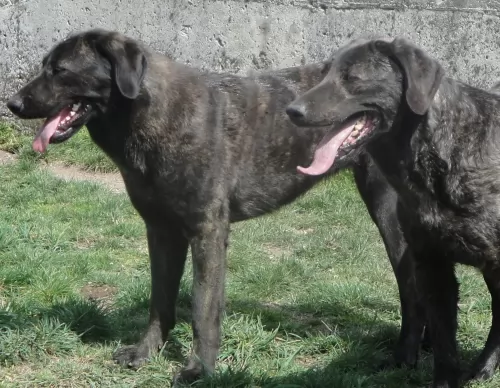 The Cao de Castro Laboreiro has a short coat which requires minimal grooming. Brushing him twice a week to rid him of loose hairs will suffice.
The Cao de Castro Laboreiro has a short coat which requires minimal grooming. Brushing him twice a week to rid him of loose hairs will suffice.
Nail clipping as well as ear- and teeth cleaning are other routine maintenance procedures for your pet.
The food you give your pet must be well-balanced and have protein and carbohydrates. If you want his skin and hair to remain healthy, vitamins, fatty acids and minerals will also be needed.
Boneless chicken and fish, brown rice and vegetables can be a good choice as well as some of the top quality commercially manufactured foods. An active dog will always need a higher protein content and therefore including raw meat into the diet is imperative – not every day as it can be very expensive, but every other day.
Remember that bones can be dangerous as they can splinter and cause your pet internal damage. Fresh, cool water must be available at all times.
 These are giant breed dogs, so you have to be careful with the way you feed them. Large dogs like these are prone to hip dysplasia so you need to choose a food which has ingredients that work to prevent this disease.
These are giant breed dogs, so you have to be careful with the way you feed them. Large dogs like these are prone to hip dysplasia so you need to choose a food which has ingredients that work to prevent this disease.
You have to be very careful that you don’t overfeed your dog so that the extra weight puts strain on the joints.
This dog will do well with some raw meat added into his diet. Also, include home-made food too. Boiled chicken, brown rice or pasta, sweet potatoes, carrots and spinach chopped up and added to his dry kibble for giant breeds. Added in twice a week can do him the world of good.
A good bush of the thick coat twice a week will keep the Spanish Mastiff looking his best.
The nails will also need to be trimmed regularly to avoid overgrowth and to avoid the nails catching onto things. The ears too should be checked regularly to avoid dampness inside the ear which can cause bacteria.
As a fully grown adult, the Spanish Mastiff isn’t a frisky, frolicking dog but he will still require daily exercise. Options for exercise include long walks, hikes, swimming and ball games.